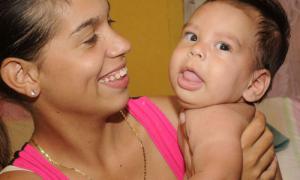
On the occasion of its 90th anniversary, the Cuban Society of Pediatrics is to hold its 28th National Congress, Pediatría 2018, dedicated to preventive aspects and problems affecting the health of infants, children and adolescents.
“If on the one hand we have the constant challenge of maintaining and continuing to reduce indicators such as infant mortality, which we recently celebrated having reached its lowest rate in history, we pediatricians and other related specialists today face a greater challenge, linked to the first, to guarantee quality from the very beginning of each life,” stated Dr. Fernando Domínguez Dieppa, a second grade specialist in neonatology and pediatrics, for whom it is not only a question of reducing infant deaths, but also that children have better health and development.
Contrary to what one might believe, there is, for example, evidence of a rigorous longitudinal study undertaken at the González Coro Hospital, which shows that the same elements that served to reduce infant mortality rates in very low weight infants, born weighing under 1,500 grams, have also resulted in a reduction over the last 13 years in the number of children with sequelae, or problems, and a higher percentage of minors with normal neurodevelopment; a trend that has also been evident in other areas of the country, the professor and senior researcher noted.
The 28th Cuban Pediatrics Congress, Pediatría 2018, which will be attended by some 400 Cuban and international delegates from 8 countries, will therefore offer a space to show results in at risk patients, based on neonatal and pediatric intensive care, and the research carried out in this area from different parts of the country.
The event will run alongside the 7th International Symposium on Neonatal and Pediatric Intensive Care and the 2nd International Symposium on Childcare, from January 23 - 26 at the Havana International Conference Center, and has an ambitious program, which includes themes related to prevention, health promotion and intensive care of critically ill children.
As Dr. Fernando Domínguez Dieppa explained, Cuban developments in the field of retinopathy of prematurity prevention, as well as the screening of metabolic diseases and hearing disorders, will be outlined.
Similarly, details of the country’s cardio-pediatric and nephrology-pediatric networks and the system for the detection of children with malignant diseases (about 200 each year), timely intervention and diagnosis, will be discussed.
Dr. Gladys Abreu Suárez, second grade specialist in pediatrics and president of the event organizing committee, added that the scientific program includes activities such as an infectology symposium organized by the Pedro Kourí Institute of Tropical Medicine, which will address everything related to arbovirosis and its treatment in children, and the follow-up protocol for children of mothers who had Zika.
Likewise, she noted that Pediatría 2018 includes two symposia on new vaccines, with the collaboration of the Finlay Institute. The first concerns technology transfer with India, in which this country offers the vaccine against rotavirus, which requires technology that Cuba has difficulty in acquiring.
The second, she added, will deal with the Cuban pneumococcal vaccine - which is in the final phase of a clinical trial - and which protects against pneumonia and meningitis. The tests and results of clinical trials of this vaccine will be outlined, a product that if approved will join the other 13 vaccines of the country’s immunization schedule.
The advantages of the use of SURFACEN to treat children with acute respiratory distress syndrome, a product applied to premature babies in Cuba since 1990, will also be presented in coordination with the National Center for Clinical Trials, pediatricians and intensivists.
Pediatría 2018 will also offer a space to recognize not only the best of Cuban research in the field of child health, but also to award the Aballí prizes, in honor of Dr. Ángel Arturo Aballí Arellano, the forefather of this specialty in Cuba, which recognize pediatricians who, in addition to practicing care and teaching, are linked to research.
A woman pediatrician will also be recognized, with the Liane Borbolla Vacheren award, in tribute to the first woman to receive a PHD in Medical Sciences in Cuba, and the first and only woman to have been president of the Cuban Society of Pediatrics.
Meanwhile, the event is also dedicated to two honorary members of the Cuban Society of Pediatrics: Santiago Valdés Martín, senior professor of the specialty at the University of Medical Sciences of Havana, forefather of pediatric nephrology on the island, and Professor José González Valdés, pulmonologist and consultant and merit professor, both of whom are already in their nineties and are still active in teaching, care and research.
Also to be commemorated are Cuban National Hero José Martí on the 165th anniversary of his birth, and Fidel, who noted “nothing is more important than a child,” representatives of the values to which Cuban health professionals dedicate their efforts every day.















